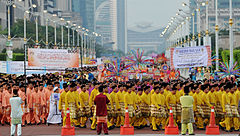| Mawlid | |
|---|---|
 Malaysian Sunni Muslims in a Mawlid procession in capital Putrajaya, 2013. | |
| Observed by | Adherents of mainstream Sunni Islam, Shia Islam and various other Islamic denominations |
| Type | Islamic |
| Significance | Commemoration of the birth of Muhammad |
| Observances | Hamd, Tasbih, public processions, Na`at (religious poetry), family and other social gatherings, decoration of streets and homes |
| Date | 12 Rabi' al-Awwal |
| Frequency | once every Hijri year |
| Part of a series on |
| Muhammad |
|---|
Mawlid (Arabic: مولد) is an annual festival commemorating the birthday of Islamic prophet Muhammad on the traditional date of 12 Rabi' al-Awwal, the third month of the Islamic calendar. A day central to the traditions of Sunni Islam, the Mawlid is also celebrated by Shia Muslims.
The history of this celebration goes back to the early days of Islam when some of the Tabi‘un began to hold sessions in which poetry and songs composed to honour Muhammad were recited and sung to crowds in the major cities.[2] The celebration was continued either by the Abbasids and the Fatimids. The Muslim general Gökböri, a deputy of Saladin (r. 1174–1193), is believed to have been the first to publicly celebrate Mawlid, which he did in an impressive ceremony at the Prophet's Mosque in Medina. The Ottomans under Murad III (r. 1574–1595) declared it an official holiday.
Celebrants hold mahfils on Mawlid in which religious poetry is recited in praise of Muhammad accompanied by a feast. Other customs affiliated with Mawlid are supererogatory fasting, Islamic music and dhikr. Most denominations of Islam approve of the commemoration of Muhammad's birthday.
The Mawlid observance is generally approved of across the four Sunni schools of law, by mainstream Islamic scholarship and it is a recognized national holiday in most of the Muslim-majority countries of the world.
- ^ "12 Rabi ul Awal 2019 – When is Eid Milad un Nabi 2021". IslamicFinder. Retrieved 29 September 2021.
- ^ "Islamic Supreme Council of America – Islamic Supreme Council of America".